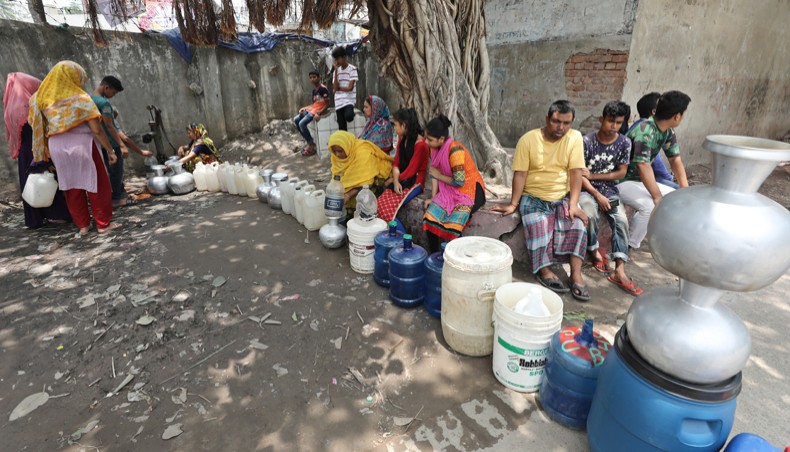Capital gets no respite from water crisis
Domestic water crisis became more acute at different parts of the capital amidst the heat wave continuing causing untold public sufferings in Ramadan.
Nurunnahar Begum, 54, of Mokki Masjid Goli in West Rampura, said Saturday that she found it unthinkable that a busy housewife like he could not bathe for the last five days as the area had been facing acute water crisis over the last 22 days.
And after five days, she took bath with only three mugs of water her husband had brought from a mosque about a quarter km from her home.
She said Dwasa ceased to care about public sufferings.
‘My husband and sons bring water from the mosque every day paying Tk five per jar,’ she said.
Nurunnahar’s story is shared by at least 5,000 residents of Mokki Masjid Goli.
Angry people of the area blocked the busy DIT Road for hours on Thursday demanding solution to their perennial water crisis as Dwasa took no steps to solve their problems despite repeated complaints.
Similarly, people of Mirpur, Jurain, Donia and Madartek water became scarce or unusable due to contamination with filth during this unbearable summer.
Dwasa managing director Taqsem A Khan admitted to New Age that water could not be supplied to some of the areas.
But he said, ‘there is no water crisis in the capital.’
‘These are temporary area wise problems,’ he said.
He said that the crisis would continue until the dry season when a number of deep tube wells became dysfunctional due to low groundwater table.
He claimed that the situation now was better than the previous years.
In March, he said on the eve of Ramadan that water crisis would be a matter of the past.
Transparency International Bangladesh in a report said in April that the capital’s 91 per cent families burn gas worth Tk 3.32 billion to boil water supplied by Wasa to make it drinkable.
Nearly 62 per cent service seekers face corruption and other irregularities in Dhaka Water Supply and Sewerage Authority, says the TIB report.
Taqsem claimed that Wasa supplied water was drinkable direct from tape.
Following the announcement Mizanur Rahman, a resident of Jurain went to Dwasa office and offered Taqsem shirbit made of Wasa supplied water but Taqsem refused to drink it.
Mizanur Rahman on Saturday said that water crisis at his area deepen after the incident as residents did not get water in supply line.
Dwasa’ consumers said that the crisis became more acute since March and fears that the situation would deteriorate as the lone water utility was showing no interest to address the issue.
Akbar Ali, a resident of Jurain said that he needs to buy drinking water worth Tk 1,000 each month for his family of four.
He said that dirty water supplied by Wasa was at the root of the crisis.
He said that many people in the area developed itching and other skin diseases after bathing with water supplied by Wasa.
He said many people were suffering from jaundice and other chronic diseases.
He said that the problem became endemic in the area.
Dhaka South City Corporation councillor Jumman Miah said that people from different areas in Dania complained to him about the water crisis they had been facing for years.
Families living at Jatrabari, Sayedabad, Wari, Meradia, Goran, Hazaribagh, Ibrahimpur, Mirpur and Gulistan complained that they always get filthy water not fit for drinking, cooking, bathing or washing utensils and clothes.
They said that if boiled, the sticky water with green colour supplied by Wasa ‘gets stickier and thicker.’
Dwasa is producing 255 crore litter water per day against the demand of 245 crore litter.
Taqsem said that the water crisis occurs as Dwasa depends on 809 deep tube wells to supply 30 per cent water to its consumers.
News Courtesy: www.newagebd.net











